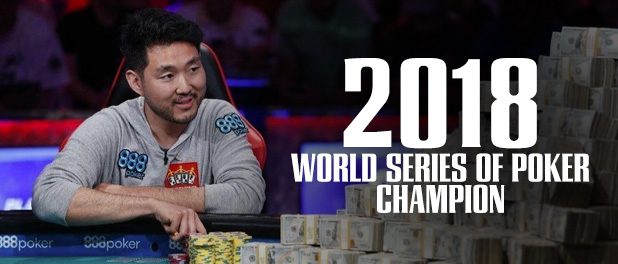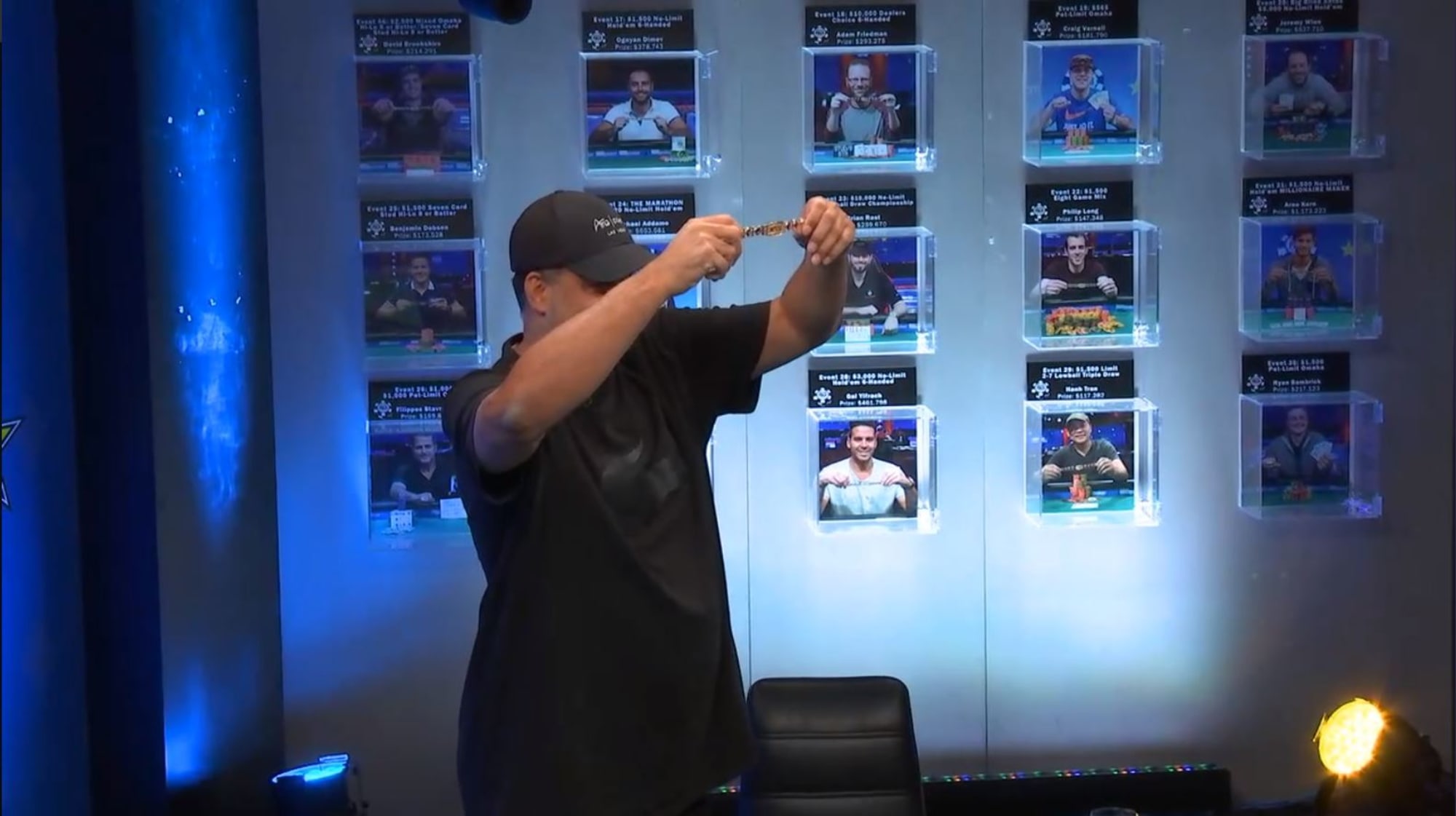It is quite likely that most (if not all) of the winners were backed and will, in the end, only enjoy a portion of their winnings. I ignore backing in this analysis (because the full details are rarely publicized). Now, on to the winners. Congratulations to John Cynn of Evanston, Illinois for winning the 2018 WSOP Main Event and a cool $8,800,000. And last updated 2018-02-23 20:32:04-05 A guest at The D Las Vegas hit a $100,000 jackpot recently. The jackpot was on a poker machine at the downtown casino's Longbar where the player hit a royal. LAS VEGAS - John Cynn defeated Tony Miles heads-up to win the 2018 World Series of Poker main event early Sunday morning, claiming poker's world championship and $8.8 million. John Cynn is $8.8 million richer thanks to a huge win at the 2018 World Series of Poker Main Event, but he says he’s taking his time before spending a good chunk of his money — he’ll speak.
Over the past two weeks 7,874 competitors (myself included) paid $10,000 to enter the main event of the World Series of Poker. Who would win the money? And how much of the winnings would they actually get to keep?
One important note: I do need to point out that many of the players in the tournament were “backed.” Poker tournaments have a high variance (luck factor). Thus, many tournament players sell portions of their action to investors to lower their risk. It is quite likely that most (if not all) of the winners were backed and will, in the end, only enjoy a portion of their winnings. I ignore backing in this analysis (because the full details are rarely publicized). Now, on to the winners.
Congratulations to John Cynn of Evanston, Illinois for winning the 2018 WSOP Main Event and a cool $8,800,000. After a mammoth 10-hour heads-up battle against Tony Miles (where the chip lead went back and forth), Mr. Cynn finally prevailed when his king-jack flopped trips and all Mr. Miles could muster was queen-high. Mr. Cynn will pay federal income tax, self-employment tax (all nine of the final players are professional gamblers), and Illinois income tax. Of his winnings he’ll lose an estimated $3,860,183 to tax (keeping $4,939,817), a tax burden of 43.87%. Mr. Cynn definitely benefits from tax reform; had he had the same winnings in 2017 he would have owed $4,094,676 so he saves $234,493. Another way of looking at this is his tax burden last year would have been 46.53%. Mr. Cynn has the second highest tax burden of the final nine.
The aforementioned Tony Miles finished in second place. A resident of Jacksonville, Florida, Mr. Miles benefits from Florida’s lack of a personal income tax. Mr. Miles, like all of the Americans at the final table, will owe federal income tax and self-employment tax; he’ll owe an estimated $1,939,341 (38.79%) of his winnings.
Finishing in third place and winning $3,750,000 was Michael Dyer of Houston. Mr. Dyer had the chip lead for the first part of the final table but ran into a full house of held by Mr. Miles. The Texan avoids state income tax but will still lose an estimated $1,449,275 to federal tax (38.65%). Mr. Dyer has the lowest tax burden of the six Americans at the final table (and the second-lowest tax burden overall).
Nicolas Manion of Muskegon, Michigan started the final nine with the chip lead but couldn’t make it through; he ended up in fourth place for $2,825,000. Mr. Manion is the only individual who will end up paying three taxes: federal, state, and city. Michigan has a flat income tax of 4.25% and Muskegon has a city income tax of 0.5%. Still, Mr. Manion is better off in 2018 than if he had won this in 2017; he’ll lose only an estimated $1,217,323 to tax (43.09%).
Joe Cada finished fifth for $2,150,000. If that name sounds familiar, it should: Mr. Cada won the Main Event in 2009. This time around Mr. Cada’s pocket tens lost a classic race against Mr. Miles’s ace-king. Thanks to tax reform, Mr. Cada loses only 40.59% of his winnings to tax ($872,635) compared to 42% back in 2009. Mr. Cada, a resident of Shelby Township, Michigan, owes federal and Michigan tax.
Aram Zobian of Cranston, Rhode Island, ended up in sixth place for $1,800,000. A professional poker player, Mr. Zobian will owe federal and Rhode Island tax. Rhode Island has marginal tax rates up to 5.99%, so it’s in the middle of the pack for states. Overall, Mr. Zobian will owe an estimated $721,821 in tax (40.10%).
Alex Lynskey of Melbourne, Australia finished in seventh place. While the US and Australia have a tax treaty, it does not cover gambling. Thus, of Mr. Lynskey’s $1,500,000 of winnings, he loses 30% off the top to the IRS ($450,000). Australia does not tax gambling winnings for amateur gamblers but it does tax gambling winnings of professional gamblers. The Australian tax system somewhat mirrors ours in that are marginal rates; however, Australia’s top rate is 45% compared to our 37%. The US-Australia Tax Treaty does specify that a foreign tax credit can be taken for taxes paid to the other country. Mr. Lynskey would have paid an estimated $666,296 to the Australian Taxation Office; given the US tax he’s paid that number is reduced to $216,296 (or $292,000 Australian).
In eighth place was Artem Metalidi of Kiev, Ukraine. Mr. Metalidi will pay the least tax of any of the final nine, both in dollars and by percentage. Ukraine has a flat tax rate of 18% plus a 1.5% military tax (a total of 19.5%). Mr. Metalidi will lose only an estimated $243,750 of his $1,250,000 to tax. None of that is going to the IRS: The tax treaty between the Ukraine and the United States exempts gambling winnings from taxation.
Antoine Labat, a professional poker player from Vincenna, France, finished in ninth place. He earned an even $1 million, but that’s before taxes. The United States and France have a tax treaty exempting gambling winnings, so he lost nothing to Uncle Sam. However, France is anything but a low-tax environment. While 2018 French tax rates have not been announced (they’re not announced until late in the year), based on 2017 rates Mr. Labat will lose $432,574 (€369,721) of his $1 million (€854,701) winnings to taxes.
Wsop Winnings 2018
Here’s a table summarizing the tax bite:
Poker Winner 2018
| Amount won at Final Table | $28,075,000 |
| Tax to IRS | $9,811,437 |
| Tax to Illinois Department of Revenue | $435,600 |
| Tax to France Tax Administration | $432,574 |
| Tax To State Fiscal Service (Ukraine) | $243,750 |
| Tax to Australia Tax Agency | $216,296 |
| Tax to Michigan Department of Treasury | $211,438 |
| Tax to Rhode Island Division of Taxation | $37,978 |
| Tax to City of Muskegon Treasurer Department | $14,125 |
| Total Tax | $10,953,198 |
That means 39.01% of the winnings of the final nine will go to taxes. That’s up from 2017 because last year four of the final nine faced no taxation (they were all residents of the United Kingdom which does not tax gambling winnings).
Here’s a second table with the winners sorted by their estimated take-home winnings:
| Winner | Before-Tax Prize | After-Tax Prize |
| 1. John Cynn | $8,800,000 | $4,939,817 |
| 2. Tony Miles | $5,000,000 | $3,060,659 |
| 3. Michael Dyer | $3,750,000 | $2,300,725 |
| 4. Nicolas Manion | $2,825,000 | $1,607,677 |
| 5. Joe Cada | $2,150,000 | $1,277,365 |
| 6. Aram Zobian | $1,800,000 | $1,078,179 |
| 8. Artem Metalidi | $1,250,000 | $1,006,250 |
| 7. Alex Lynskey | $1,500,000 | $833,704 |
| 9. Antoine Labat | $1,000,000 | $567,426 |
| Totals | $28,075,000 | $16,871,802 |
Mr. Metalidi finished in eighth place but based on after-tax winnings he finished in seventh place. The Ukraine’s low flat-rate income tax gives him a benefit over the relatively high taxes in Australia.
But the true winner this year was the Internal Revenue Service. The IRS’s take of $9,811,437 exceeds the combined after-tax winnings of the first and second place winners ($8,000,476) and nearly exceeds the top three! Taxes may be what we pay for a civilized society, but we sure pay a lot of them. One truism this year (as usual) is that the house (the IRS) always wins.
Tags: WSOP
John Cynn is $8.8 million richer thanks to a huge win at the 2018 World Series of Poker Main Event, but he says he’s taking his time before spending a good chunk of his money — he’ll speak with tax and investment experts before taking the next steps.

But he does have plans for his post-WSOP celebration, which will take him overseas.

Cynn spoke with For The Win earlier this week and peeled back the curtain a bit on the man behind the large stack of money. Here’s what we learned:
1. He was technically homeless during the World Series of Poker
“My lease in Los Angeles was up June 28,” he said. “My plan was to move into my friend’s guest house in Vegas when the WSOP was done. I just stayed in the casinos during the tournaments. When they asked me where I lived, I wrote down ‘homeless.'”
2. He was inspired by a personal tragedy
A friend of his died in December and changed his perspective on life entirely.
“I always had what I considered a strong positive outlook on life,” he said. “When this happened, I tried to enjoy everything and enjoy the journey. As crazy as it may sound, when there were 12 people left, I was doing well in chips. I would joke with my friends: I could find a bad run of cards and go back down to 12th. They’d say, ‘Shut up, why would you say that?’ Even though I was joking, I knew if that happened, I’d be perfectly fine. I played the cards the best I can and whatever place I get I can live with.”
Cynn listened to music during the tournament that reminded him of his friend and her former boyfriend cheered him on from the rail, telling Cynn she was watching over him and helping him.

3. He’s going to spend a whole lot of time traveling
Cynn was going to do it anyway, but now that he has some cash at his disposal, it’ll make those plans much easier: He’s going to see his nephew in Geneva, flying with friends to Southeast Asia and will head to Australia in January. In addition to that, he’ll have duties as the new “poker ambassador” — that includes a contract with 888 Poker — which might require him to travel.
“I want to be nomadic for a while,” he said.
4. He quit his job as an IT consultant years ago to go pro and his parents weren’t pleased
Wsop Bracelet Winners 2018

“When I first turned pro I didn’t tell parents for six months because I knew they would be absolutely devastated,” he said. “I remember the meal I told my mom I had quit to play poker. She was absolutely crushed, it made things tough for quite some time.”
Now?
Poker Winners 2018 Winners
“My family loves it more than I do. After the win, we went to a restaurant, people were asking for pictures. My parents were trying to take photos for me.”